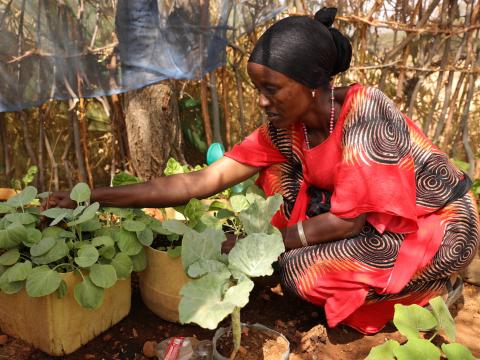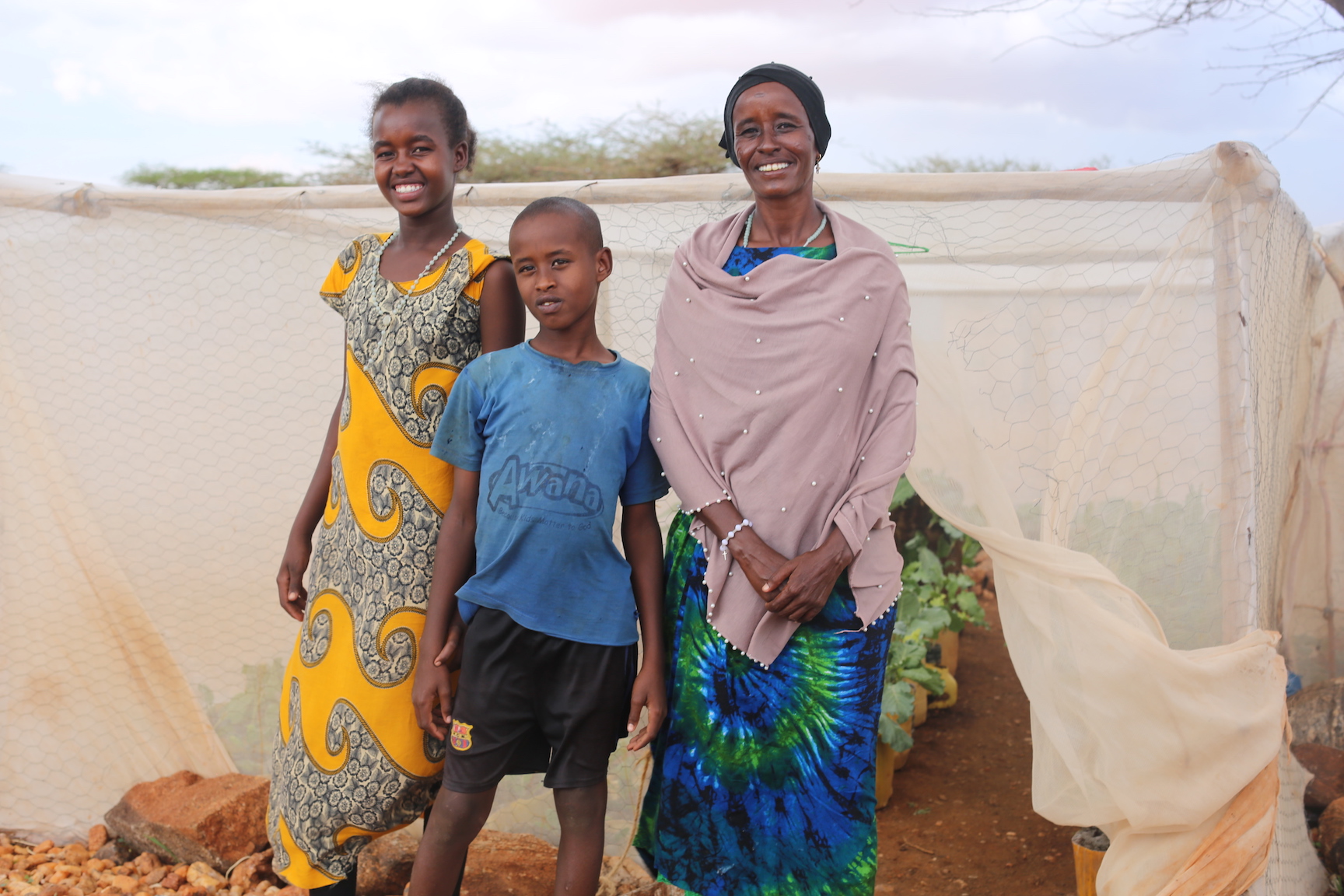Kitchen Gardens Improve Nutrition and Household Income in Laisamis

By Irene Sinoya, World Vision Communications Specialist, Kenya
The joyful faces and smiles of Saroi’s two children are a sight to behold. Their bouts of laughter and giggles fill the air as they run around their compound at Laisamis in Kenya’s Marsabit County, playing various games.
These two children - Lolusu and Neitumu – are among the many beneficiaries of World Vision’s Kitchen Garden initiative, which has enhanced the nutrition status of children in communities in Laisamis.
“I love eating fruits and vegetables that mum has planted outside our house because they are good. They have made me healthy. Now, I don’t fall sick all the time like I used to,” says 8-year-old Lolusu.

Right to Left; Saroi with her two children Lolusu, 8, and Neitumu, 10. © Copyright World Vision/By Irene Sinoya.
As a widow with three children and no major source of sustainable income, 41-year-old Saroi notes that she used to struggle to provide food and take good care of her loved ones.
Consequently, the children suffered from malnutrition a condition that made them frail and sickly most of the time.
“Our main diet was maize flour mixed with water and cooking oil. That is what me and my children drank every day for survival,” Saroi explains.
Tides began changing for the family after she was trained and supported by World Vision to establish a kitchen garden.

Saroi with her daughter Neitumu (10) at her kitchen garden in Kenya's Laisamis County. ©Copyright World Vision/By Irene Sinoya.
This initiative is anchored under the World Vision's Food and Nutrition Security Resilient Enhancement Project (FONSAREP), funded by GIZ and World Vision donors from Germany.
“They first taught us about the importance of good nutrition. That is when I learnt that all of us, especially children, need a balanced diet to be healthy and strong,” Saroi says.
The kitchen gardens enabled her and other trained women to plant a variety of vegetables and fruits that are a good source of vitamins and other vital nutrients.
“World Vision provided us with improved vegetable seeds. We prepared nursery beds and transplanted the seedlings. My children now enjoy different types of vegetables and fruits, like watermelon, that I didn’t know existed,” says Saroi cheerfully.
Even though residents of Laisamis are largely pastoralists, widows and other vulnerable members of the community are often unable to afford livestock (cows, goats and sheep), for use as sources of household income or food.
To tackle this challenge, Saroi decided to rear chicken, based on the poultry farming techniques she learnt during the World Vision training sessions.
“This was new to me because we only know livestock here. But, now my children can get protein from the chicken and eggs they lay.”
Aside from having sufficient food, Saroi's vegetable farming generates surplus produce that brings income to the family.
“I sell vegetables from the kitchen garden and save the money which I use to pay school fees, buy uniforms and pay medical bills,” she says.
At first, Saroi and other women were skeptical about the project. But, after reaping its benefits, they began sharing the knowledge and empowering other people to embrace kitchen gardens as well.
Saroi and other women in Kenya's Laisamis County that have embraced kitchen gardens. @World Vision Photo/By Irene Sinoya
“We have established an association of 14 members. We help each other to make sure our kitchen gardens are productive and encourage others to start theirs as well," explains Saroi.
They use locally available resources to boost farm productivity, such as applying manure from poultry or livestock to fertilise soils and using pepper and ash for pest or disease control.
“I urge other women to start kitchen gardens because they are beneficial. The crops are nutritious, especially to children and pregnant mothers. I am so grateful to World Vision for changing our lives,” Saroi states.
Watch this video to learn more about the impact of the Food and Nutrition Security Resilient Enhancement Project (FONSAREP) in Kenya.
